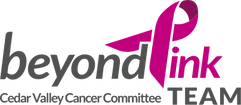What is ADVOCACY?
|
Breast cancer is a political issue.
The federal government is the largest funder of biomedical research. Laws regulate and support access to care and health care systems. Third party payors are subject to state and federal regulations. In fact, every aspect of breast cancer is touched by public policy. It is key that those who influence that policy are educated and trained and have no agenda other than to save lives, and to end breast cancer. What does ending breast cancer mean? We must understand:
Going Beyond the Sea of Pink While the majority of breast cancer research and advocacy is focused on finding the next treatment drug, Beyond Pink TEAM advocates advance the conversation beyond a “sea of pink” to truly taking steps to bring an end to this disease that attacks 1 in 8 women in the United States. Every thirteen minutes, a woman dies from breast cancer. We invite you to join our efforts to STOP THE CLOCK. |
|
Want to become an educated breast cancer advocate?
If you are interested in becoming a Beyond Pink TEAM breast cancer advocate, we encourage you to attend NBCC’s Advocate Leadership Summit held in Washington, DC, in late April or May each year for three days, followed by the annual NBCC Lobby Day on Capitol Hill. The conference is geared toward advocates of all experience levels. It is NBCC’s national meeting of breast cancer advocates from around the world. There are sessions on the latest scientific research, training in effective advocacy strategies, and presentations by respected researchers in the field, grassroots leaders from around the country, and prominent public policy experts. The NBCC Annual Advocacy Conference is open to everyone interested in the fight against breast cancer including breast cancer patients, survivors, activists, educators, and researchers. For more information about Beyond Pink TEAM’s work with NBCC contact Christine Carpenter (319) 266-0194 or [email protected]. |
|
When I learned that having surgery, radiation, and/or chemotherapy does not guarantee an end to breast cancer I became angry. I have turned that anger into action. Advocating for improvements in research, treatments and access to care for breast cancer patients has enriched my life.
- Beth, age 58
|

